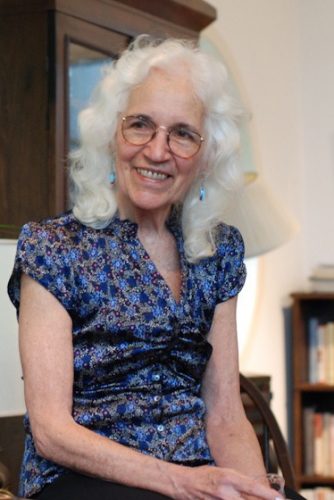
About Maggie Kast:
My first career was in modern dance, as performer, choreographer, and Artistic Director of Chicago Contemporary Dance Theater. I began to write seriously as by body became less able to invent, as I lost the ability to “think movement.”
After thirty years of marriage and the birth of five children my husband died, and I lost a listener. The page took over that role, reflecting my thoughts back to me. Soon, within that journaling, poems and stories began to emerge, kernels that I could develop and shape. When my writing practice had grown to three-four hours a day, I enrolled in the low-residency M.F.A. program of Vermont College of Fine Arts, where I was fortunate to find wonderful writer/teachers who mentored by developing craft.
What inspires you to write?
Who can say where inspiration comes from? The spirit arrives like the first breath of a newborn. I enjoy making things: dances, stories, babies, bread. I am motivated to make by experiences of joy or grief, awe or anomie, which beg for containment within a narrative. IfI have to place the source I’d say that inspiration comes from buried layers of my psyche or from powers that lie beyond my ken. In either acse, outside of my control.
What authors do you read when you aren’t writing?
They vary over time. Always: Tolstoy, Chekhov, Joyce. As a teen: Ernest Hemingway, Charlotte Bronte. Lately: J.M. Coetzee, William Maxwell, Alice Munro, Ian McEwan, the German writers, Jenny Erpenbeck and Walter Kempowski, the poet and essayist, Christian Wiman.
Tell us about your writing process.
Seat of the pants, for sure. I discover the story by writing it. Most days I go from dreams to writing when I rise, before I speak. Two thirds of what I write goes in the trash. I read my writing in full voice and listen to the sounds as well as sense. I listen to critique from my writing group and editors, and I revise, revise, revise.
For Fiction Writers: Do you listen (or talk to) to your characters?
I gather bits of diction from the world around me and try to reproduce it on the page. When I read aloud I listen for authenticity, but I do not actually talk to characters or listen to them speak.
What advice would you give other writers?
Write every day. Benefit from dialogue with other writers. First drafts are just a borehole into the wondrous world of your imagination. Be open to what you find in there, be it flowers or monsters.
How did you decide how to publish your books?
I never wanted to self-publish. Printing is not the same as publication, which means “making public,” while self-publishing is more private. If you can get an agent and sell a manuscript to one of the few remaining major publishers, go for it! If not, consider independent or non-profit or university presses, many of which have wonderful lists and good, attentive editors. My experience with three of such presses has been highly collaborative and rewarding.
What do you think about the future of book publishing?
I hope that even as paper books become old-fashioned, they may increase in cultural value. Think of how computer-generated mail today is made to imitate hand written. Perhaps we’ll go back to the Middle Ages and use hand illumination to make beautiful, unique books. This, of course, is just a fantasy and would be death to the literacy made possible by Gutenberg.
What genres do you write?: Memoir, novel, novella, short stories, essays
What formats are your books in?: Both eBook and Print
Website(s)
Maggie Kast Home Page Link
Link To Maggie Kast Page On Amazon
Your Social Media Links
Goodreads
Facebook
Twitter
LinkedIn
Instagram
All information in this post is presented “as is” supplied by the author. We don’t edit to allow you the reader to hear the author in their own voice.
